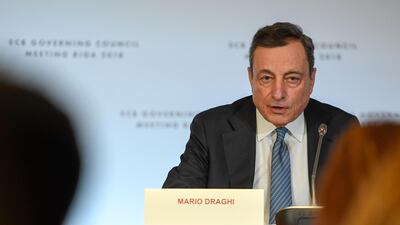The European Central Bank and the lenders it oversees are running out of time in their push for rules to foster cross-border mergers.
European Union regulations need to change so consolidation makes financial sense, the ECB and firms say. But their shared urgency has been stymied by politicians from Germany and smaller states who want to make sure closer ties don’t expose them to excessive risks from other countries.
Euro-area leaders meet at the end of this month to discuss further integration of the currency zone, including the so-called banking union intended to remove barriers to expansion. They’re unlikely to make progress on crucial elements of the plan, including a common deposit insurance system. And they won’t have many more chances to hammer out a deal before next spring, when EU elections and a changing of the guard in Brussels mean lawmaking grinds to a halt until the end of the year.
“Banking union is not in place, and there are not yet enough benefits for banks to consider merging,” said Pauline Lambert, a bank analyst at Scope Ratings. While some steps have been taken, thorny issues like deposit protection need to be tackled. “I am not sure there will be real progress on this front at the summit,” she said.
For now, CEOs from Societe Generale to Deutsche Bank are lining up to pour cold water on deals. Mergers and acquisitions in the euro area have declined since the crisis, and in 2016 reached their lowest level since 2000, Daniele Nouy, head of supervision at the ECB, said last September. And the mergers that happen are domestic, not cross-border.
Banks need a “revenue incentive” to consider tie-ups with firms in other euro-area countries, said Jernej Omahen, an analyst at Goldman Sachs. To do that, “you allow a bank to source deposits in where they’re cheap,” such as Germany, and “lend them out where asset rates are more attractive, such as Madrid or Milan. And for that to happen, we need a complete banking union.”
_______________
Read more:
Euro slumps as ECB sets date for end of huge stimulus programme
Deutsche Bank and key investor seek to reassure shareholders after rating downgrade
_______________
The EU’s banking-union project, which dates back to 2012, is an attempt to level the playing field in the bloc’s financial markets and avert future crises. It consists of the Union’s rule book, centralised supervision by the ECB and a bank-failure authority, the Single Resolution Board.
The planned common deposit insurance system remains on paper largely because of opposition from Germany, which insists on first making further progress in removing risk from the system, for example by tackling the mountain of non-performing loans on banks’ balance sheets in countries like Greece and Italy.
With mergers slowed to a trickle, banks have also cut cross-border lending. A big part of the problem is that member states are hesitant to scrap limits on banks moving cash and reserves between units. The ability to use capital and liquidity either side of a border would make mergers more attractive for banks, says Guntram Wolff, director of Bruegel, a Brussels-based think tank.
The ECB is trying to reduce such ring-fencing, “but there is still a lot of resistance from member states, probably in part because deposits are guaranteed at the national level,” he said.
The European Commission, the EU’s executive arm, proposed making this easier by allowing supervisors to waive requirements for a banking group’s subsidiaries to comply with their own capital and liquidity requirements. The proposal was part of a raft of banking legislation under consideration by EU member states and the European Parliament.
The commission’s idea was shot down by finance ministers as they staked out their position on the bills. It also faces skepticism in the European Parliament, which plans to vote on its stance on Tuesday.
Another factor that might influence bankers contemplating expansion in another country is the political uncertainty in countries such as Italy and Spain. When politicians in core euro-area countries raise the possibility of abandoning the common currency, it can be hard to contemplate cross-border mergers.
“Tackling ring-fencing will not be enough in the end if you feel that Italy might drop out of the euro,” Mr Wolff said. “This is still one of the main reasons why it’s so hard for big financial institutions to integrate across several countries.”

